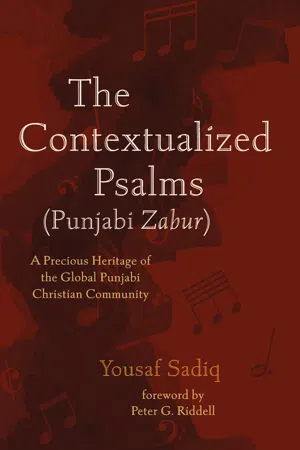
The Contextualized Psalms (Punjabi Zabur)
A Precious Heritage of the Global Punjabi Christian Community
- 186 pages
- English
- ePUB (mobile friendly)
- Available on iOS & Android
The Contextualized Psalms (Punjabi Zabur)
A Precious Heritage of the Global Punjabi Christian Community
About This Book
The metrical translation of the Psalms into the Punjabi language, set to indigenous music in the late nineteenth century in India, plays a vital role in the personal and communal worship of the global Punjabi Christian community. This book is a pioneer work that comprehensively encompasses the cultural, socio-historical, missional, and sociolinguistic aspects of the Punjabi Psalter. It investigates the unique and fascinating story of the contextualizing of Psalms in an exclusive South Asian Punjabi context and engages in an in-depth study on the life and work of Rev. Dr. Imam-ud-Din Shahbaz. This work determines to bring a deeper appreciation for the Punjabi Psalter by encouraging the Punjabi Christians to not only pass the Psalms on to the next generations but also to grow in loving and valuing their mother-tongue, the Punjabi language. The thrust of this book is to esteem the shared heritage of the global Punjabi Christian community--the Psalms in Punjabi, commonly known as the Punjabi Zabur.
Frequently asked questions
Information
The Making of the Punjabi Psalter
Table of contents
- Title Page
- Foreword
- Acknowledgments
- List of Abbreviations
- Introduction
- Chapter I: The Making of the Punjabi Psalter
- Chapter II: The Contributors for the Punjabi Psalter
- Chapter III: The Punjabi Psalms
- Chapter IV: The Present-Day Usage of the Punjabi Psalms
- Chapter V: Missiological Aspects of the Psalms in an Islamic Context
- Chapter VI: The Sociolinguistic Circumstances Facing Pakistani Punjabi Christians
- Bibliography